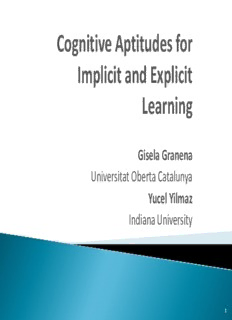
+ aptitude - GRAL Seminar on Individual Differences PDF
Preview + aptitude - GRAL Seminar on Individual Differences
Cognitive Aptitudes for Implicit and Explicit Learning Gisela Granena Universitat Oberta Catalunya Yucel Yilmaz Indiana University 1 Conceptualizing language aptitude: Past and Present Applying aptitude to explain variation in: Ultimate attainment (i.e., ceiling) Outcomes under different instructional interventions (i.e., rate) Future research and applications 2 How do individuals differ in learning languages? Affective (e.g., motivation, personality) Experiential (e.g., language experience) Biological (e.g., age) Cognitive (e.g., language aptitude) 3 “Special talent” for language; “language flair”; “knack” for languages No unitary construct of aptitude: Not one indivisible ‘thing’ but many ‘things’ (componential) We should speak of cognitive aptitudeS for language learning: Cognitive and perceptual abilities that predispose individuals to learn well or rapidly 4 J. B. Carroll as the dominating figure (50’s and 60’s) Carroll’s assumptions about aptitude: Componential Independent of intelligence True for some aptitudes (Woltz, 1990, 1999) Not true for other aptitudes Intelligence Working Memory (Engle et al., 1999; Kyllonen, 1996; Kyllonen & Christal, 1990) Intelligence LLAMA tests B, E, F (Granena, 2012) Innate and stable Some aptitudes are trainable (Jaeggi et al., 2010, 2011) or impacted by experience (Papagno & Vallar, 1995; Grigorenko et al., 2000) 5 Carroll’s model and the MLAT (Carroll & Sapon, 1959) ◦ Phonetic Coding: Ability to form associations between sounds-symbols = Auditory ability ◦ Rote Learning: Conscious storage of information in LTM by repetition = Memory ability ◦ Grammatical Sensitivity: Ability to Language recognize grammatical functions = analytic ability ◦ Inductive Learning: Ability to infer (Skehan, 1989) (notice and identify) patterns or rules 6 • Weighted in favor of explicit cognitive processes Conscious reflection on language forms, time to think and analyze, and memorize Designed to predict rate under intensive conditions (audiolingualism) • Advances in understanding how languages are learned and in teaching methodology (Long & Doughty, 2009) Study of language as object vs. experiential approaches • Advances in the understanding of human memory systems (e.g., Baddeley & Hitch’s WM model in 1974) 7 • New aptitude constructs Implicit learning and memory processes as abilities (Woltz, 2003) (e.g., primability, SRT anticipations) Learning “in the absence of 1) conscious intention to learn 2) conscious awareness of the fact that we are learning 3) conscious attribution of any noticed change to the effects of learning” (Jiménez, 2002: 62) Meaningful individual differences do exist (Kaufman et al., 2010; Reber & Allen, 2000) vs. Reber (1989) Carroll and Maxwell’s (1979) “budding but fitful and hesitant courtship between psychometrics and experimental cognitive psychology” (p. 604) 8 Doughty et al.’s (2010) Hi-LAB (High Level Language • Aptitude Battery) Active Memory and Processing (WM, STM, Task Switching, Processing Speed) Foreign Sounds (Learning/Distinguishing foreign sounds) Implicit Learning (Priming, SRT Anticipations) Explicit Learning (Explicit Induction, Rote Memory) 9 Granena (2012; 2013a) • Explicit Language Aptitude: Relevant for explicit language learning and processing (intentionally) through reasoning and deliberate hypothesis testing LLAMA B, E and F in the LLAMA aptitude test GAMA (intelligence) Include study time (offline measures) Involve working out relations (problem-solving) Allow strategy use Implicit Language Aptitude: Relevant to acquire patterns in input without awareness of the rules (implicit induction) LLAMA D Probabilistic Serial Reaction Time Task No study phase Involve online processing Minimal demands on executive functions 10
Description: